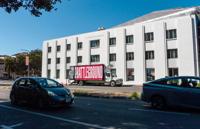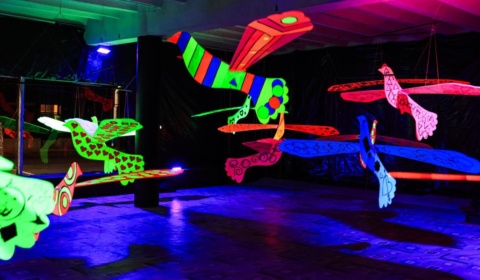“We started in Times Square, then along the East Coast, then Iowa and Kansas City,” Ann Lewis, artist and tour manager, disclosed in an interview. “We’re going everywhere.”
The Project for Empty Space’s mobile gallery stopped during their nationwide tour at Berkeley on Oct. 3. Though the pieces on view rotate at every stop, each curation by Jasmine Wahi and Rebecca Jampol responds to themes of reproductive justice, queer liberation and trans joy. The project couldn’t have come at a better time. Lewis and her crew will be traveling within the country and after the 2024 presidential election, where transgender and reproductive rights will be prominent issues on the ballot.
“Even Republican states?” a passerby overhearing our conversation chided.
“Even Republican states,” Lewis confirmed. “Actually, this is our last day in friendly territory.”

Parked alongside the Berkeley Art Museum & Pacific Film Archive, the 27-square-foot truck — designed by Barbara Kruger — intends to spark discussion regarding the relentless wave of conservatism that politicizes queer liberation and reproductive justice. The “Body Freedom for Every(Body)” exhibit features contributions from hundreds of distinct artists. Thus, the bus houses an eclectic range of statues, paintings, interactive elements and prints. Just a quick glance inside provides a kaleidoscope of colorful knick-knacks and paintings. A closer look grants viewers protest art that seeks to define the 21st century struggle for reproductive and gender-affirming care in the United States.
Inside sits Michele Pred’s “Freedom is for Everybody,” a purse with its title stitched to the front.
“I call my purses ‘Power to the Purse.’ It’s all about being able to associate typically feminine objects with power and liberation,” Pred remarked.
Pred is a Berkeley native, and noted that her childhood growing up amid the 1960s Free Speech movement has largely impacted her work now.
“We’re kind of trying to do the same thing too: spread civic joy, activism and everything we can. It never changes,” Pred commented.
Alongside “Power to the Purse,” Pred also contributed oversized and inflatable abortion pills that greet visitors at the entrance of the bus. The exhibit hopes to remind its audience that empowerment comes in a multitude of forms. With her two pieces, Pred honors both sexual and financial liberation.
Within the jungle of ribbon, chrome pregnancy tests and women’s liberation-inspired paintings lives the truck’s “library,” a small room scattered with books, magazines and articles. The room’s walls were lined with Ron Norsworthy’s “Toile de vogue #3,” featuring toiles of queer Black figures flamboyantly striking poses atop an island — a refreshing take on the typically white, colonial textiles that rule the cultural landscape. Amid my visit, I found myself in conversation with the beautifully talented Amisha Yadava, creator of “Huq: I Seek No Favor,” a magazine featuring the works of fifty artists, each interpreting four pages of the 213 paged Dobbs v. Jackson case. The title refers to an Urdu word meaning “rights.”
“I came to the United States from India, and it’s meant to be the promised land,” Yadava said. “When I saw the Supreme Court decision, it felt as if America had broken its promise and taken all that away from me. I mean, it takes us back 50 f—ing years.”
“Huq: I Seek No Favor” displays art in a variety of forms. Leafing through the magazine, I found one of my favorite pieces of the exhibit: lawyer and artist Julie G. Krishnaswami’s annotations of her four pages, ripping the constitutionality of the verdict apart. Another piece by Marcy Palmer featured pennyroyal, a plant that has been used to induce abortion for centuries, but is lethal in the wrong dose, showcasing the importance of legalizing safe abortions.
Yadava’s addition to the collection? A portrait featuring South-Asian modern art pioneer Amrita Sher-Gi, who died due to complications of a failed abortion at 28 years old. Beautifully, Yadava intertwines her past life in India and her current struggles as an American, all while paying homage to the many lives lost due to unsafe abortion practices.
The “Body Freedom For Every(body)” mobile installation is an artistically cluttered demand for urgency within reproductive justice. Specifically, the truck focuses on intersectionality, as artists highlight the disparities between marginalized communities, wealthy white health care access and the unnecessary struggle for gender-affirming health care.
All in all, the bright pink truck best celebrates the uncelebrated — the shunned, oppressed and ignored — hoping to push for liberation within such communities. Not only does the exhibit serve as a rallying cry for change in 2024, but the exhibit also mourns the many lives complicated and lost due to lack of legal representation regarding sexual and reproductive rights. Transgender and abortion policies are not only issues of the immediate presence, but instead enduring matters that have plagued the lives of millions. A trip to the “Body Freedom For Every(body)” installation reminds visitors of a cold, hard-to-swallow truth in America — your body is a battleground.


